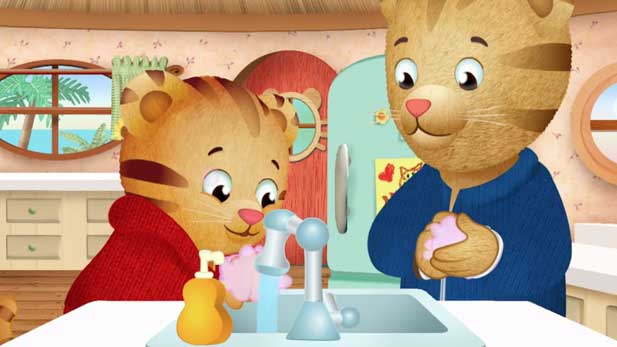 Good hand washers, like Daniel Tiger, are germ busters!
Good hand washers, like Daniel Tiger, are germ busters!Earlier this week, I overheard my kids engaged in a round of “I heard” and “Did you know?” while they were getting ready for bed.
“I heard that Margaret’s dad has it,” said my six-year-old.
“Did you know that it’s the worst sickness ever?” added my eight-year-old.
Neither statement is accurate, but they were revealing: I had thought my initial conversations with my kids about COVID-19 had been good enough. But with adults, kids at school, and the news all hyper-focused on this coronavirus outbreak, my reassuring voice needed to be a little louder.
A favorite Mister Rogers quote ran through my mind: “Anything that's human is mentionable, and anything that is mentionable can be more manageable. When we can talk about our feelings, they become less overwhelming, less upsetting, and less scary.”
So before lights out, we talked. I asked what they had heard about the coronavirus. We got it all out — their questions, their “I heards” and their fears. The rest of the conversation had three themes.
First, I shared age-appropriate facts and corrected misinformation. Because my kids are young, I kept it simple. “You know what it’s like to have a cold or the flu — how sometimes you get a cough or have a fever? This is kind of like that. Most people who catch this sickness stay home, rest, and get all better. And we have wonderful doctors and nurses who can help people when they need it.”
Second, I reassured them that they are safe, which is the most important message my kids can hear from me. I know that they take their emotional cues from my tone. “You don’t need to worry. Right now, lots of amazing grown-ups are working hard to keep people healthy. Luckily, we already know a lot about how to keep healthy!”
Third, I emphasized simple things our family can do to be “germ busters” — for all types of germs that are out there! As Harvard’s Dr. Richard Weissbourd once shared with me, kids and adults alike are “more distressed when we feel helpless and passive, and more comfortable when we are taking action.” The hygiene routines that slow the spread of the COVID-19 are the same habits that help keep us healthy all year round.
Here are four ways we can help young kids build germ-busting habits.
Wash Your Hands
Make it a family routine before every meal and snack to wash hands. If you do it together, you can model for them how to use soap, rub your hands together and rinse. For a timer, try slowly singing the ABC’s together while you scrub. In Curious George, the Man with the Yellow Hat has a cold. He teaches George how germs can move from person to person, and that it's important to wash your hands and avoid sharing utensils. Good hand washers, like Daniel Tiger, are germ busters!
Catch that Cough
When kids cough or sneeze, they tend to do it right into their hands — and then they use those hands to touch everything in sight! Instead, we can cough and sneeze into our elbow. Make it a game with kids. Can they catch the cough in their elbow? In the beginning, cheer when they do: “You caught it! That’s what germ busters do!” If they accidentally “catch it in their hands,” they can simply wash their hands with soap and water and start the game again.
"Rest is Best"
Daniel Tiger reminds us that “When you’re sick, rest is best!” This is a good episode to show kids and a great song to sing when they are feeling under the weather. Tell them: "When we are sick, we can stay home and rest our bodies; we can be germ busters by not spreading germs or going to school sick." And as parents, we can keep ourselves and our kids home if we have a fever or other symptoms.
Practice Healthy Habits
Remind kids that sleep, exercise, and eating healthy foods are good, everyday ways to strengthen our bodies. We all get sick sometimes! They have probably already had at least one cold this season. But we can be responsible germ busters when we practice handwashing, cough-catching, resting, and basic healthy living.
Deborah Farmer Kris is a writer, teacher, parent educator, and school administrator. She works on parenting projects for PBS KIDS for Parents and writes about education for MindShift, an NPR learning blog. Deborah has two kids who love to test every theory she’s ever had about child development! Mostly, she loves finding and sharing nuggets of practical wisdom that can help kids and families thrive — including her own. You can follow her on Twitter @dfkris.

By submitting your comments, you hereby give AZPM the right to post your comments and potentially use them in any other form of media operated by this institution.